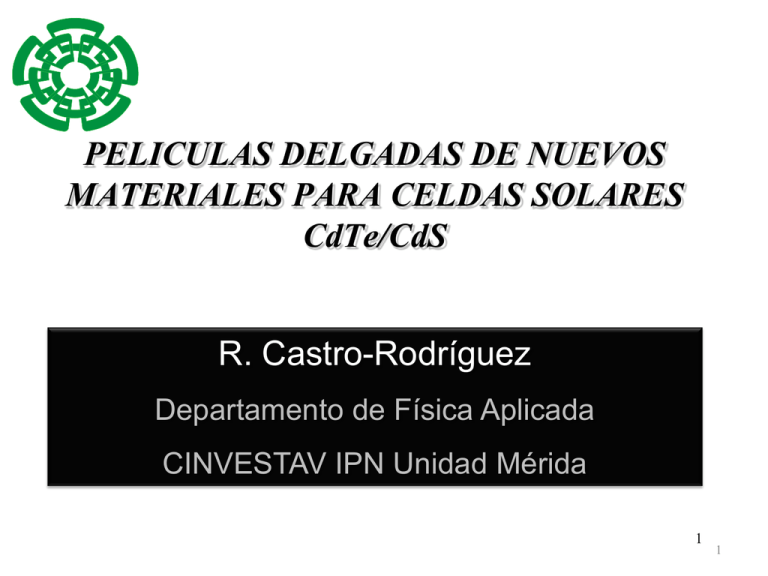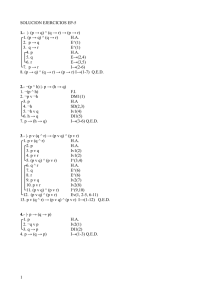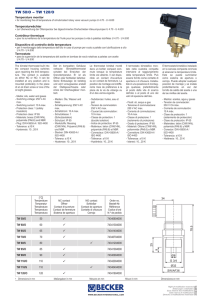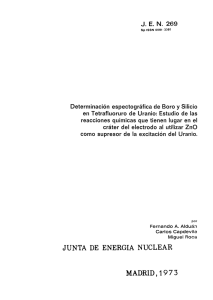CINVESTAV.- Celdas solares
Anuncio

PELICULAS DELGADAS DE NUEVOS MATERIALES PARA CELDAS SOLARES CdTe/CdS R. Castro-Rodríguez Departamento de Física Aplicada CINVESTAV IPN Unidad Mérida 1 1 Estructura de una Celda Solar CdS/CdTe The cell is composed of four layers: The front contact Back Contact CdS CdTe CdTe CdS The back contact Front contact Both front and back contact are composed of 2 sublayers Glass Como funciona una celda Solar CdS/CdTe Sb2Te3 (200 nm)+Mo (200 nm) Carga externa CdS 80 nm ZnO 300 nm ITO 400 nm Lus Solar 5 Detalles experimentales ¿Qué es PLD? Vacío de la cámara 10-6 Torr Pulsos Láser Nd:YAG =1064 nm ~2 J/(cm2) por disparo 5 Hz Rotación del Target (5 rpm) Introducción Del gas reactivo (O2) Target: Polvo de in2O3 embebido en estaño metálico Número de disparos: 2000 Calentamiento Distancia target-sustrato Substrato 40 mm Vidrio Corning No. 7059 6 2 12x12 mm The single layers: Front Contact ITO: This layer is deposited at 400 C substrate temperature with a Deposition Rate greater than 40 Å/sec by D.C. sputtering using a ceramic target. With a thickness of 400 nm, a sheet resistance of ~5 /sq is obtained. ZnO ITO ZnO: on top of the ITO layer 100-150 nm of ZnO are deposited by D.C. reactive sputtering in an atmosphere of Ar containing 20% of O2 with a deposition rate greater than 30 Å/sec using a Zn target. Resistivity of ZnO is ~103 -cm . The role of ZnO layer is both to hinder the In diffusion from ITO and to separate CdS from ITO in order to limit the effect of eventual pinholes 7 that could be present in CdS, since this layer is very thin (80-100 nm). Eje de Rotación = 500 rpm Substrato de Vidrio Porta-Substrato 3.0 mm Película de CdS Bloque de Grafito Polvo Prensado de CdS Lampara de Halogeno Resistencia Electrica Visión esquemático de la Técnica CSS con giro de substrato The single layers: The window CdS layer CdS is deposited at 250 C substrate temperature by R.F. sputtering with a deposition rate greater than 20 Å/sec in an Ar atmosphere containing 5% of CHF3. CdS Normally, good CdS films are obtained also by CSS. However, due to the small thickness of the CdS layer (80 nm) is preferred to use sputtering since it allows a better thickness control. CdS CSS_rotación vs CdS rf_sputtering 1.0 Ok Pure CdS XR-4 d = 380 nm 0.8 0.6 T T CdS (F) XR-5 d = 319 nm 0.4 Ok 0.2 0.0 500 600 700 800 nm 10 Tecniche usate per la deposizione: Sublimazione a distanza ravvicinata (CSS) La “sublimazione a distanza ravvicinata” viene usata dall’Antec Solar. Non è una tecnica commerciale, ma può essere facilmente costruita e non ha dimostrato problemi di scalabilità Substrato in movimento, 500 C Lampade scaldanti 5 mm Blocchi compatti di CdTe, 700 C Procedura trattamento HCF2Cl + Ar Manometro (baratron) Termocoppia Gas inlet CdTe CdS Buffer layer ITO Glass HCF2Cl+ Ar Vuoto I singoli strati: il CdTe Morfologia superficiale di un film di CdTe depositato per CSS e non trattato. Morfologia superficiale dello stesso campione dopo il trattamento termico in atmosfera di Ar+HCF2Cl. I singoli strati: il contatto posteriore Mo Strato Buffer CdTe Sul CdTe è depositato uno strato buffer per sputtering ad una temperatura del substrato di 250 C, senza alcun etching sulla superficie del CdTe. Infine, sullo strato buffer vengono depositati 150 nm di Mo per sputtering in corrente continua con una velocità di deposizione di 60 Å/sec. ITO CdS Mo Corte de una sección transversal real de una celda solar CdTe\CdS Laboratory results: Efficiencies larger than 14% are routinely obtained with this process on an 1 inch2 soda-lime glass substrate. Best efficiency is 15.8% with: VOC = 0.862 V VOC = 0.862 V JSC= 25.5mA/cm2 ff = 0.72 Area= 1cm2 JSC= 25.5mA/cm2 ff = 0.72 The parameters of the cell have been measured under AM 1.5, 100 mW/cm2 simulated solar light. Towards the Industrial Production of CdTe/CdS Thin Film Modules The process which we will use to produce CdTe/CdS thin film modules is quite simplified in many aspects such as: The CdS film is done by RF sputtering and a much better control thickness is obtained. of Treatment of CdTe is done by using a gas that is inert and non toxic room temperature. The step of CdCl2 deposition has been removed. its at CdTe is not etched before back contact deposition. The buffer layer in the back contact renders the cells much more without affecting their efficiency. stable The in-line process 400 C RT RT Glass Wash and dry machine ITO DC sputt. ZnO DC reactive sputt. with O2 The technology to fabricate CdTe/CdS thin film solar cells can be considered mature for a large scale production of CdTe-based modules. A stable efficiency of 15.8% has been demonstrated for 1 cm2 laboratory cell and it is expected that an efficiency of 12% can be obtained for 0.61.2m2 modules. 500 C laser scribing 1st section 400 C 250 C 1st RT RT CdS RF sputt with CHF3 CdTe CSS with O2 Treatment with HCF2Cl Vacuum cleaning of CdTe surf. 250 C RT 3rd laser scribing To the lamination RT Mo DC sputt 2nd section 2nd laser scribing Buffer layer DC sputt 3rd section A fully automated in-line process could produce 1 module every 2 minutes at a cost substantially less than 1€/W. MUCHAS GRACIAS


